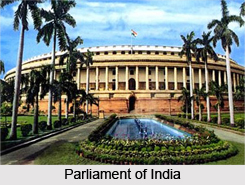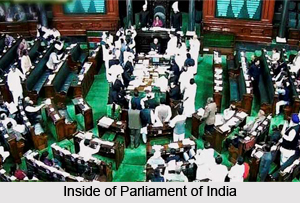 In India, the Members of Indian Parliament refer to all the members of the Indian Parliament both in the Lok Sabha or the Rajya Sabha. Members of the Lok Sabha are elected popularly by constituencies in each of the Indian states and Union territories while in the Rajya Sabha the members re-elected indirectly by the State Legislatures. Each of the Indian state is allocated fixed number of seats in both the houses of Parliament. Uttar Pradesh has comprises of the highest number of seats in the Rajya Sabha. The Central Government of India is formed by the party which has the highest number of elected members in the Lok Sabha. Sometimes the Government is also a coalition in government.
In India, the Members of Indian Parliament refer to all the members of the Indian Parliament both in the Lok Sabha or the Rajya Sabha. Members of the Lok Sabha are elected popularly by constituencies in each of the Indian states and Union territories while in the Rajya Sabha the members re-elected indirectly by the State Legislatures. Each of the Indian state is allocated fixed number of seats in both the houses of Parliament. Uttar Pradesh has comprises of the highest number of seats in the Rajya Sabha. The Central Government of India is formed by the party which has the highest number of elected members in the Lok Sabha. Sometimes the Government is also a coalition in government.
 Qualification of Members of Indian Parliament
Qualification of Members of Indian Parliament
Article 83 of the Constitution of India lays down the qualifications for membership of the two houses of Parliament. In order to be eligible to be chosen as a member, a person must be a citizen of India and not less than 30 years of age in case of Rajya Sabha membership and not less than 25 years of age in case of Lok Sabha membership. Additional qualification may be prescribed by the law.
Disqualification of Membership in the Parliament
Under Article 102, a person shall be disqualified for being chosen as and for being a member of either House,
* If he is not a citizen of India or otherwise owes allegiance to a foreign state,
* If he is an undischarged insolvent or one declared by the competent court to be of unsound mind,
* If he holds any office of profit under the Union or State Government other than the office of Minister or any office exempted by Parliament.
* A person may be disqualified under any law made by Parliament.
* Also, a person may be disqualified on grounds of defection under the Tenth Schedule which was added to the Constitution by the 52nd Amendment.
If any question arises whether a member of either House has become subject to any disqualification, it shall be decided by the President after obtaining the opinion of the Election Commission of India and in accordance with the opinion except in case will be decided by the speaker of Lok Sabha or the Chairman of Rajya Sabha as the case may be.
The job of the Parliament and its members is to represent the people, to lay down policies, to make laws and to exercise surveillance over the executive action. With the exception of the Members, other members are not expected to exercise any executive powers by accepting any office of profit under the Government of India. If those charged with the responsibility of overseeing the executive, themselves become part of the executive establishment or become beholden to the executive for an office of profit under the Government, obviously they cannot be expected to faithfully perform any worthwhile oversight functions. That is the reason why Article 102 of the Constitution provides that apart from certain other things holding an office of profit under the Government would constitute a disqualification for membership of Parliament. Giving a somewhat arbitrary power to the Parliament/State Legislatures, it is provided that any offices can be exempted from disqualification. Constitutional provisions for the State Legislatures corresponding to articles 102 and 103 are articles 191 and 192.
Few of the notable Members of Indian Parliament are, Harin Pathak, Virjibhai Thummar, Solanki Bharatsinh Madhavsinh, Naranbhai Rathwa, Lal Krishna Advani, Dinsha Patel, Vaghela Shankersinh Laxmansinh, Jivabhai Ambalal Patel, Chaudhary Tusharbhai Amarsinhbhai, Koli Patel Somabhai Gandabhai, Patel Harilal Madhavjibhai and others.






